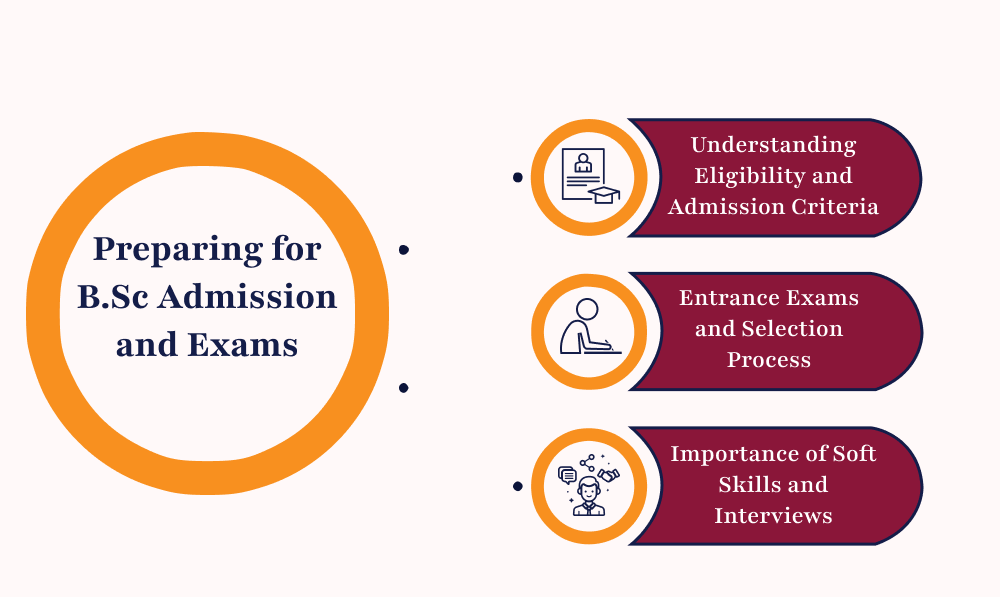1.Introduction
2.Why does pursuing a B.Sc. matter today?
74% of Indian employers planned to hire freshers in January to June 2025, with AI‑related roles leading demand; Bengaluru (78%), Mumbai (65%), and Chennai (57%) were the top hubs. These staggering statistics might be enough for you to comprehend the rising demand for science and IT graduates in India.
Science-driven roles power technology, healthcare, environmental solutions, and design. Employers actively seek graduates with analytical depth and practical skills from a strong B.Sc Program. A solid foundation from the right B.Sc. college will give you the tools to solve real problems and step into emerging fields with confidence.
Across India, student interest in computer science, IT, data science, and creative tech like animation is surging. This is because organizations need people who can- code, analyze, visualize, and build reliable systems.
Whether the goal is- a) software, b) analytics, c) cybersecurity, d) UI/UX, e) biotech, or f) media-tech, g) scientific training, it ensures students learn how to reason, test, and iterate skills recruiters notice immediately.
3.Versatility of a B.Sc. degree
A B.Sc. degree can take graduates into software development, data analytics, network engineering, cloud ops, VFX and animation, product testing, QA, and applied research. This same degree can also be a launchpad for higher studies (M.Sc., MCA, MBA, specialized diplomas) or industry certifications. That’s why picking the right B.Sc. Program (and the right campus environment) matters as much as the coursework.
4.Real-life impact of a strong B.Sc. education
Students who work on labs, real projects, internships, and hackathons graduate with portfolios, not just marksheets. That portfolio, plus communication and teamwork, translates into interviews, offers, and faster career mobility.
Who is this guide for?
5.Understanding the B.Sc. Landscape
5.1.What is a B.Sc. program?
By now, you might have some idea about a B.Sc. program. Now, let's get into understanding it more deeply. A B.Sc. is a three-year undergraduate path that blends theory, labs, projects, and applied learning across specializations such as:Colleges in tech-forward cities offer strong industry exposure, so choosing the campus wisely is crucial.
5.2.Types of B.Sc. courses in India and Pune
Popular tracks include:
5.3.Benefits of a B.Sc. degree
5.4.Myths and misconceptions about pursuing a B.Sc
Reality: Not true, graduates thrive across IT services, product companies, startups, creative studios, and consulting.
Reality: Hiring depends on skills and projects; B.Sc. grads with internships, certifications, and portfolios compete very well.
Reality: Modern animation and VFX use advanced software, physics-based rendering, pipelines, and scripting that are deeply technical and creative.
6.How to Choose the Right B.Sc. College
A good college should give you strong academics, helpful teachers, and the right resources, like labs and libraries. It should also offer good placements, internships, and chances to build practical skills. Location, fees, and student support also matter when making a choice.
6.1.Factors to consider
When shortlisting a B.Sc. College, evaluate:
- Accreditation and recognition: Check university affiliation, NAAC/NIRF status, and program approvals.
- Faculty expertise: Look for faculty with strong academic credentials, research, or industry work.
- Curriculum relevance: Syllabi should include current tools and electives aligned with current industry needs.
- Infrastructure: Labs, software licenses, studios (for animation), libraries, and maker spaces.
- Placements and internships: Track placement partners, average packages, internship pipelines, and project showcases.
- Industry tie-ups: Centers of excellence, live projects, guest lectures, and mentorship.
6.2. Location and affordability
City ecosystems shape opportunities. Pune’s educational environment is known for internships, meetups, hackathons, and strong alumni networks, making it a hotbed for a B.Sc. college search if students prioritize industry access.
While comparing top BSc colleges, consider the balance of fees, living costs, commute, and scholarship options with the campus placement network and labs
Read More: B.Sc Colleges in Pune6.3.Student support and extra-curricular opportunities

Great colleges invest beyond academics:
6.4.Using rankings and reviews wisely
Rankings can guide, but verify claims. Cross-check placement statistics, partner companies, and median packages. Read student/alumni reviews for faculty quality, lab access, and campus culture. Confirm internship conversion to PPOs, and assess how portfolios are showcased (GitHub, Behance, demo reels).
7.Preparing for B.Sc. Admission and Exams

Students need to understand eligibility criteria, collect documents, and keep track of important dates for applications, counselling, and fee payments. For colleges that require entrance exams, preparation should be focused on core subjects, logical reasoning, and technical basics.
Beyond academics, developing communication and soft skills is equally important. Since interviews, group discussions, and statements of purpose often form part of the selection process.
7.1.Understanding eligibility and admission criteria
Most colleges admit students who have completed 10+2 with relevant subjects (often Mathematics for CS/IT). Some conduct merit-based admissions; others use entrance tests. Students should prepare documents (marksheets, identity proofs, category certificates if applicable) and track deadlines for forms, counselling, and fees.
Read More: B.Sc Eligibility Criteria7.2.Entrance exams and selection process
Where exams are required, expect questions from:
7.3.Importance of soft skills and interviews
Admissions and later placements emphasize:
8.Maximizing Your B.Sc Experience
Every step you take can strengthen your confidence and open new doors towards academic excellence. B.Sc.internships and industry exposure allow you to connect theory with practice, while co-curricular activities and leadership roles sharpen your communication, teamwork, and problem-solving skills.
At the same time, networking with peers, alumni, and mentors helps you build a support system that guides your B.Sc. career decisions.
8.1. Academic excellence
8.2. Internships and practical exposure
8.3. Co-curricular and leadership activities
8.4. Networking and career planning

9. Supporting Your Child’s B.Sc. Journey (For Parents)
Parents, your support can help your child choose the right course and college, stay motivated during studies, and prepare for future opportunities. We have enlisted three (3) simple steps in which you can stand by your child. Whether it’s guiding them in- a) college selection, b) encouraging internships, or c) giving emotional support through ups and downs.
10. Conclusion
A B.Sc. opens the door to a wide range of scientific and technical careers, making it one of the most versatile undergraduate choices. It equips students with- a) knowledge, b) practical skills, and c) the ability to think critically. These qualities are valuable in every industry, from research and technology to data, design, and beyond.
However, success doesn’t depend on academics alone. With the right college environment, proper preparation, and a focus on essential skills for science graduates, students can grow into confident professionals ready to take on future challenges. This journey is not just about earning a degree; it’s about building a strong foundation for lifelong learning, career opportunities, and personal growth.
Visit MIT ACSC Today.
All the best!👍

